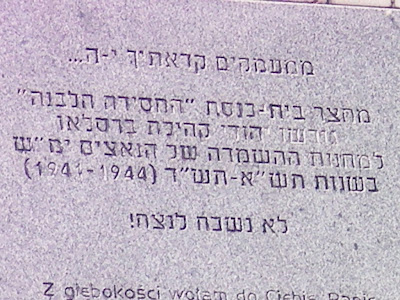Today the alumni group joined us for work. They have seen several Jewish cemeteries, as I understand it, but they have yet to do any work in one. That was interesting to see. I was back to my fire duty again. I enjoy that work and I take pride in the strength and efficiency with which it goes through debris. Before getting started my primary concern was to remove the ash pile from beneath the still burning brush. The ash pile was actually 2/3 of the total fire pile! People began bringing in cart loads of debris very quickly so there was quite the backup! As I began burning through it all, I noticed a light covering of ash around me. Ashes were landing on my head and shoulders as well. I became chilled as I thought of the movie Schindler's List. The scenes where human ashes fall from the sky kept running through my mind. I was reminded of the fires role in the destructive reality of the holocaust. However, here in this cemetery its power is not to destroy human dignity and memory, but to maintain it. That is the crucial difference between all things. It is not always what we generally do, but why we generally do it. The Nazi's burned to destroy and dehumanize. We are burning to respect and recover humanity. The evidence of what is left in both cases is the same; simple ash.
When we returned from work, we had a brief time to clean up before our second book discussion. This one focused on Elie Wiesel's Night. While reading that book I found it complicated to discern where Wiesel stands with God. I wrestled with the part about Akiba Drumer, the man who Wiesel says died because he lost his faith. If only he had kept it a few days longer. I now understand how Elie views God. He sees God in the same way as his father. Something he must desperately hold on to. He is conflicted, however, because he believes that if he lets his father go, life would be easier. Once his father dies, and upon the reflection of many years, Wiesel realizes that, upon his father's death, Wiesel himself becomes like a corpse, dead to the life around him. As much as he may like to let go of God, I think Wiesel realizes that, like Akiba Drumer, he too will perish without God. When asked why he prays, his response is, "why do I breath?" Prayer and a belief in God bring him life, and afford its continuance. I am curious now to see the play that Dr. Kellerman had talked about, where several Rabbis put God on trial. I think the connection between that play and Wiesel would be a good study in humanity's relationship with the divine.



No comments:
Post a Comment